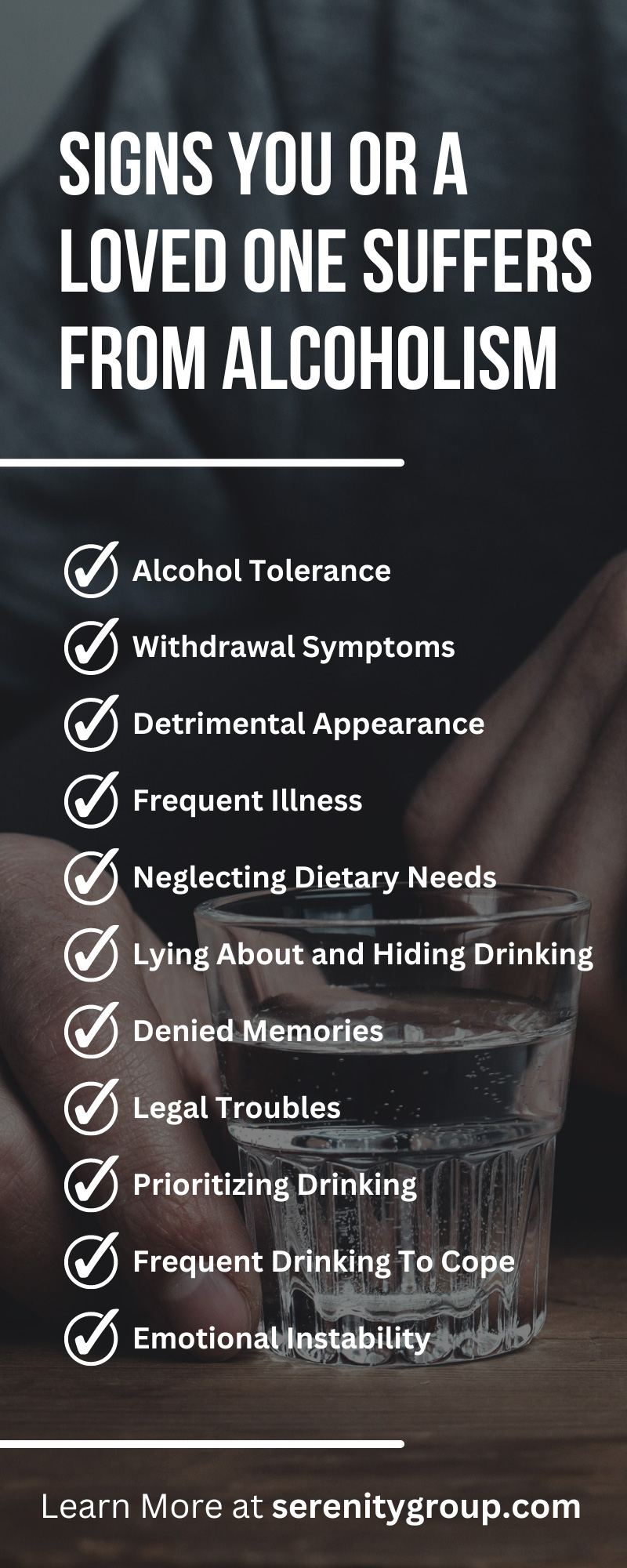15 Signs You or a Loved One Suffers From Alcoholism

Alcoholism, or alcohol use disorder, is a detrimental and sometimes life-threatening condition that affects millions of people worldwide. Understanding and identifying the signs of alcoholism in yourself or in loved ones is essential. In this comprehensive discussion, we’ll delve into the physical, behavioral, and psychological signs of alcoholism and forms of help, from rehab centers to peer groups available for those in need.
Alcohol Tolerance
People who have alcoholism often develop a tolerance for alcohol, which means they need to consume increasingly larger amounts to experience its effects. This tolerance can lead to a dangerous cycle of heavy drinking that escalates over time, affecting both their physical and mental well-being. It is crucial to recognize the signs of alcoholism and seek help to break free from this detrimental pattern.
Withdrawal Symptoms
When a person with alcoholism stops drinking, they may experience withdrawal symptoms such as shaking, sweating, nausea, and even seizures. These symptoms indicate a physical alcohol dependence. These withdrawal symptoms are severe and can be life-threatening, which is why medical assistance is almost always necessary during the detoxification process.
Detrimental Appearance
Individuals with alcoholism can exhibit a decline in personal hygiene and appearance, with unkempt hair, clothing, and skin. Additionally, they may develop facial redness, broken capillaries, and bloating. This change in physical appearance is more noticeable over time and could be a distressing outward sign of the internal harm that alcohol is inflicting on their bodies.
Frequent Illness
Excessive alcohol consumption weakens the immune system, compromising the body’s ability to defend against various illnesses. Individuals struggling with alcoholism are particularly vulnerable to respiratory infections such as pneumonia and bronchitis, as well as liver disease, due to the detrimental effects of alcohol on their health. It is crucial to recognize the impact of alcohol on the immune system and take steps toward a healthier lifestyle.
Neglecting Dietary Needs
Alcoholics, due to their excessive alcohol consumption, may gradually shift their calorie intake toward alcohol rather than food, resulting in inadequate nutrition and subsequent weight loss. This detrimental pattern of prioritizing alcohol over essential nutrients can further impair their overall health and well-being.
Lying About and Hiding Drinking
People who are grappling with alcoholism often experience a deep internal struggle, leading them to feel compelled to hide their drinking habits from others or even deceive people about the amount they consume. This secretive behavior indicates that they are at least partially aware of their problem and actively attempting to conceal it, further highlighting the complexity and challenges associated with it.
Denied Memories
“Blackouts,” which refer to the partial or complete loss of memories from events while intoxicated, are a common occurrence for individuals who struggle with alcohol dependence. These episodes of memory impairment can occur due to the disruptive effects of alcohol on the brain’s ability to form and store new memories. While blackouts may vary in duration and severity, they often serve as a red flag for the detrimental impact of alcohol misuse on cognitive functioning and overall well-being. It is crucial for individuals facing alcohol dependence to seek appropriate support and treatment to address this concerning issue.
Legal Troubles
Frequent encounters with law enforcement can be strong indicators of an underlying alcohol problem that may require attention and intervention. These encounters can change drastically as the laws change depending on location. For example, California will have different laws than Washington. From DUI charges to jail time, legal problems can follow people who struggle with alcoholism. Higher insurance costs may be another effect in states such as California, as someone with a DUI charge may need SR-22 insurance in California or other states with this system.
Prioritizing Drinking
Sacrificing hobbies, social engagements, and other activities in favor of excessive drinking is a significant red flag of alcoholism. When individuals prioritize alcohol over their once-enjoyed pastimes, relationships, and responsibilities, it can indicate a deepening dependence on alcohol and potential negative impacts on their overall quality of life. Recognizing these signs and seeking help or support for a healthier and more balanced lifestyle is crucial.
Frequent Drinking To Cope
Relying on alcohol as a coping mechanism to deal with stress, anxiety, and various other emotions indicates a dependence on it and signifies a deteriorating relationship with alcohol. This unhealthy pattern of behavior can lead to a range of negative consequences, both physically and mentally. It is important to seek healthier alternatives and professional support to develop more beneficial coping strategies.
Emotional Instability
Mood swings, irritability, and uncharacteristic outbursts can all be signs of alcoholism. These behaviors often stem from the profound impact of alcohol on the brain, which can disrupt neurochemical balance and impair judgment and emotional regulation. By understanding the underlying mechanisms behind these manifestations, you can gain a deeper insight into the complex nature of alcohol addiction and its effects on individuals.
Declining Mental Health
Individuals grappling with alcohol dependence commonly experience co-occurring mental health conditions such as depression, anxiety, or other related disorders. There is an intricate and interconnected relationship between alcohol addiction and mental health, which emphasizes the importance of addressing both aspects for comprehensive treatment and recovery.
Increased Risk-Taking Behavior
Impaired judgment, resulting from intoxication, can lead individuals to engage in dangerous or reckless actions that they would otherwise refrain from when in a sober state. This loss of inhibitions and compromised decision-making abilities increase the likelihood of engaging in risky behaviors that can have detrimental consequences for the individual and those around them.
Relationship Struggles
Alcoholism can have a profound impact on relationships, often causing significant strain on friends and family members. The increased conflicts and misunderstandings that arise can lead to a sense of isolation and detachment. It creates a ripple effect that can permeate every aspect of one’s life, affecting not only personal connections but also work, social interactions, and overall well-being. Seeking support and understanding from loved ones becomes crucial in navigating the challenges and finding a path toward recovery and healing.
Denial and Downplaying Alcoholism
Individuals who are in the grips of alcoholism can exhibit a common behavior of denying or downplaying the negative consequences associated with their excessive drinking. This defensive stance serves as a barrier, preventing them from recognizing and confronting the reality of their condition. By refusing to acknowledge the detrimental effects of their alcohol consumption, these individuals inadvertently hinder their path toward recovery and overall well-being.
Finding Help and Support
Learning the signs of alcoholism in you or your loved ones makes seeking help a lot easier. Rehab centers and support groups such as Alcoholics Anonymous are great resources for overcoming addiction. It takes courage to acknowledge the problem and strength to take steps toward recovery. With determination and support, a life free from alcoholism is possible.
Reach out and take the first step towards a healthier tomorrow. Recognize the signs and provide support to those struggling with alcohol use disorder. Together, we can help individuals overcome addiction and live fulfilling lives.


Recent Comments